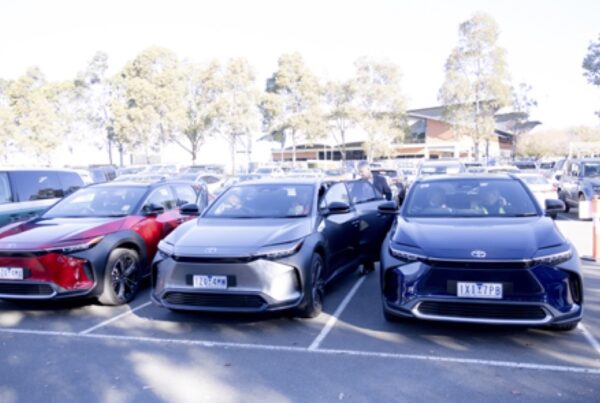Navigating the complexities of modern fleet management calls for a mix of smart strategies and an understanding of new challenges. From fine-tuning vehicle use to tapping into data-driven insights, fleet managers are always adapting to keep up.
This was the heart of the New South Wales Professional Development Forum, where industry leaders came together to share their knowledge and explore real-world solutions.
Led by Richard Schuster, Principal Consultant at TheFleetSource, the event featured valuable insights from Cornette Smith of Syngenta, Christopher Vanneste from GoGet, and Mark Mastrippolito from Life Without Barriers.
Here are the key takeaways from the forum:
Maximising Fleet Utilisation
A key focus of the forum was on optimising fleet utilisation to ensure that vehicles are always available and run efficiently.
Maintaining fleet uptime is critical and for GoGet, they have target of at least 95% uptime, meaning only 5% of the fleet should be off the road at any given time. They’ve faced challenges during the COVID-19 pandemic, particularly with extended repair times. However, through strategic partnerships and improved telecommunication solutions, they have reduced repair times from 14-15 days to approximately three days. Collaborations with companies have also facilitated the prompt replacement of missing fuel cards, further minimising downtime.
The discussion also touched on the impact of fleet refresh cycles. GoGet’s decision to sell many vehicles during the pandemic to improve cash flow created challenges in replenishing their fleet. To address this, they have updated their strategy to include refreshing older vehicles with new technology, thereby sustaining customer satisfaction and preserving residual value.
Pool Vehicles and Data Utilisation: Different Perspectives
Managing pool vehicles was also discussed. At Syngenta, pool vehicles make up 60 per cent of their vehicle fleet. These vehicles are primarily used for specific organisational needs, including transporting children in out-of-home care and accessible transport for clients with disabilities. Syngenta relies on an FMR (Fleet Management and Rental) group to handle operational complexities such as regulatory compliance and cost management.
Data also plays a key role optimising fleet management. Life Without Barriers Consolidate data from GPS and financial systems. This allowed them to reduce their fleet by 82 vehicles, saving approximately $1.6 million annually. This approach also improved fleet utilisation and highlighted the importance of refining fleet management based on business and private usage percentages.
Ownership vs. Leasing: Fleet Management Models
The panel explored different fleet management models. When an organisation owns and manages its fleet-in-house, this allows for greater control over maintenance and service schedules. The benefits of standardising vehicle makes and models were emphasised for simplifying maintenance and managing costs.
In contrast, a leasing model, which involves external partners handling various aspects of fleet management. While leasing offers flexibility and mitigates some risks, it still requires robust systems for managing infringements and other operational aspects.
Data-Driven Decisions and Future Trends
For the panel, data plays a critical role in making informed fleet management decisions. Syngenta uses telematics and data management tools to monitor vehicle usage and ensure compliance. Life Without Barriers employs dashboards to integrate financial and operational data, driving significant cost savings and operational improvements.
The discussion also touched on the evolving fleet management landscape, with a shift towards hybrid models combining in-house management with external support. This approach aims to balance the benefits of ownership and outsourcing, allowing organisations to focus on strategic aspects of fleet management while leveraging external expertise for operational efficiency.
Q&A Highlights
Q: Do you gamify your telematics?
Currently, we’re not gamifying telematics, though it’s under consideration with the Geotab system, which integrates well with our BI tools. Gamification could be a future development, but it’s not immediate.
Q: Has increased competition affected your pricing and fees?
Yes, competition from peer-to-peer companies offering older vehicles has influenced our pricing. We’ve observed shifts towards these lower-cost options but are working to maintain our pricing to uphold fleet standards. We’re also focusing on boosting business use during weekdays to balance weekend demand.
Q: How do you manage driver behaviour?
We work closely with HSC managers to investigate incidents and enforce driver training. Regular incidents lead to one-on-one training sessions.
Q: What is your strategy for electric vehicles (EVs)?
Our strategy is based on total life costs. We are adopting EVs where financially viable, especially for urban use. Currently, hybrid models are more practical for us.
Q: Why choose chattel mortgage over a financed lease?
Chattel mortgages provide tax advantages and better financial returns for us. We avoid GST on sales if vehicles are sold below a certain percentage of the purchase price, which benefits our bottom line.
Conclusion
The New South Wales Professional Development Forum provided valuable insights into modern fleet management practices, including strategies for maximising uptime, the use of data, and different fleet management models. The Q&A session further explored practical concerns and solutions, offering a comprehensive view of the current fleet management landscape.
A heartfelt thank you to our panelists and facilitator for their invaluable contributions and ongoing support of AfMA and its members!



















